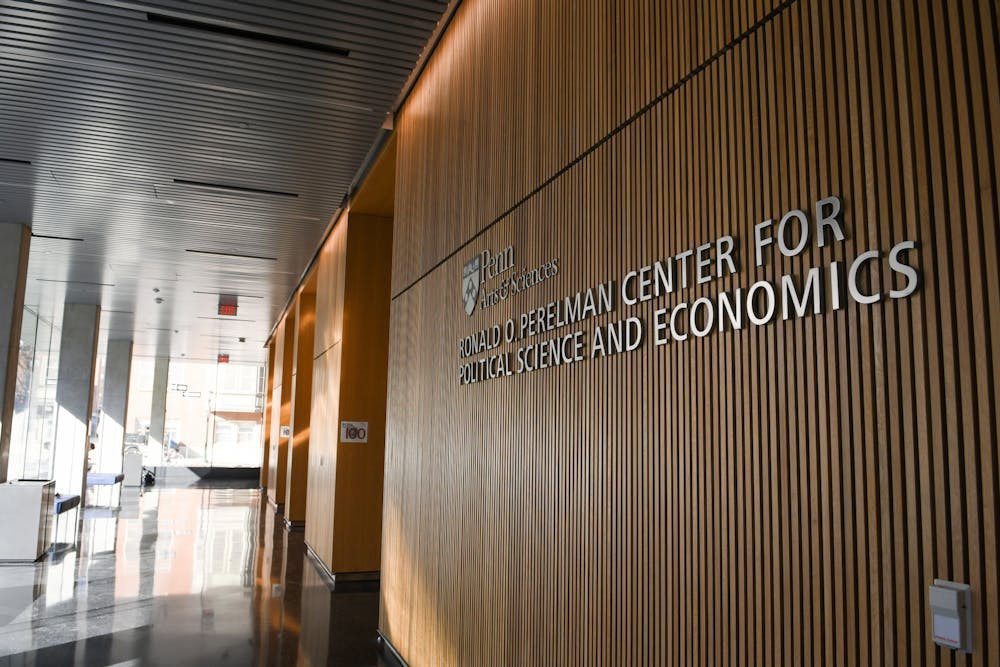
The Andrea Mitchell Center for the Study of Democracy is located at the Perelman Center for Political Science and Economics.
Credit: Anna VazhaeparambilThe Andrea Mitchell Center for the Study of Demcoracy recently launched "Poetry and Politics," an initiative that explores the intersection of poetic expression and democratic politics.
The center hosts speakers from fields of public policy and journalism, supporting undergraduate, graduate, and postdoctoral research. By combining aesthetic and political analysis, "Poetry and Politics" hopes to deepen readers' understanding of both fields.
Owen Boynton, a literary scholar and high school teacher at the Collegiate School, is leading the program by writing blog posts interpreting poems from a political perspective. So far, his posts have covered the poems of Thomas Hardy, Percy Shelley, and Sarah Kirsch. Boynton’s goal is to help the Andrea Mitchell Center community and the broader Penn community understand how poetry can help resolve political questions.
Boynton said that the idea for the initiative came partly from his previous experience running a literary blog for 12 years.
"It’s great to have a sense of your words reaching somebody," he said. "The idea of poetry and politics isn't something I've worked on directly before, but it’s broad enough to let me learn and explore.”
Boynton said he is convinced poetry can offer valuable insights into political analysis.
“Poetry does something remarkable with how the world is imagined,” he said. "The structure, language, arrangement of words. These elements embody a particular worldview. And a lot of politics depends on how we imagine the world as it is and how it could be. Poetry, then, provides a unique perspective on political realities."
Looking forward, Boynton hopes the initiative leads to greater discussion around both topics.
"The hope would be that it creates conversations, that people find enjoyment in reading poetry, thinking about it, and considering how it works," he said.
Jeffrey Green, the director of the Andrea Mitchell Center, said that the aims of the initiative include defining the political and aesthetic value of poetry, exploring the “political value” of free speech, acknowledging poetry as an “alternate modality of free speech,” and “patrolling the boundary” between public and private speech.
“The habits of mind useful to appreciating poetry are not irrelevant to the habits of mind useful for democratic citizenship,” Green said. “Attention to the subtleties of others' expression, intellectual sensitivity, aesthetic sensitivity, too, can be useful. It can be useful to heighten those capacities to make sense of and engage with fellow citizens.”
Another aspect that excites Green is the potential for the initiative to create a sense of community.
“We see this as complementing existing programming, which is more rooted in social sciences,” he said. “This initiative connects us more directly to the humanities. Already, a few people have expressed interest in contributing.”
Green emphasized that these poetry blog posts differ from the center’s typical events as they can be read and digested independently.
"This format allows us to engage with members of the Mitchell Center community in new ways,” he said. “If we get enough interest, it might even attract participants and partners we haven’t anticipated.”
Among the future contributors to the blog is Nayeli Riano, a 2017 College graduate and current Ph.D. candidate in political theory at Georgetown University. She said that she was drawn to the initiative because she sees a close connection between poetry and politics. For her, the questions posed by both fields are "the same," differing only in the methods of exploration. She believes that thinking at this intersection allows people to "channel different parts of ourselves" and become better at answering questions about the world.
Riano is particularly interested in exploring how political thought and literature communicate struggles on both individual and societal levels. For her, the value of the initiative lies in its effort to "center literature" and reach people who might otherwise feel disconnected from it. She hopes the initiative will “communicate the beauty of literature in common language.”
“Literature is one of those things that one can never stop studying,” she said.
The Daily Pennsylvanian is an independent, student-run newspaper. Please consider making a donation to support the coverage that shapes the University. Your generosity ensures a future of strong journalism at Penn.
Donate






